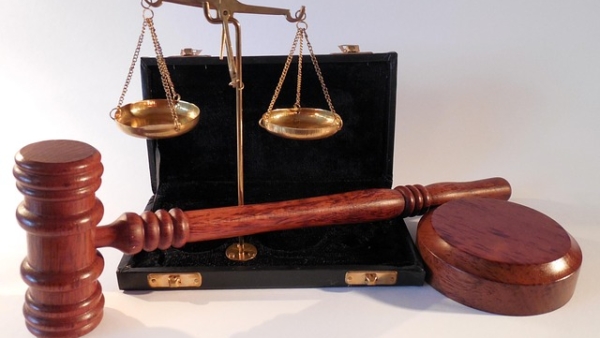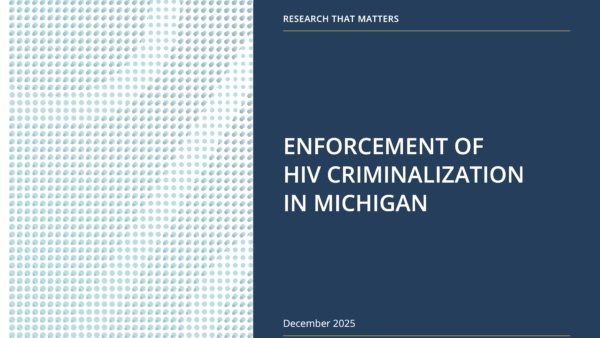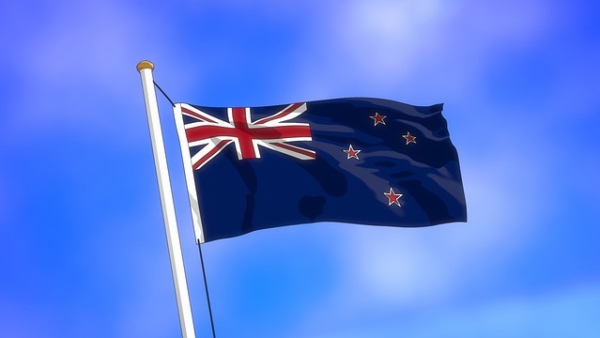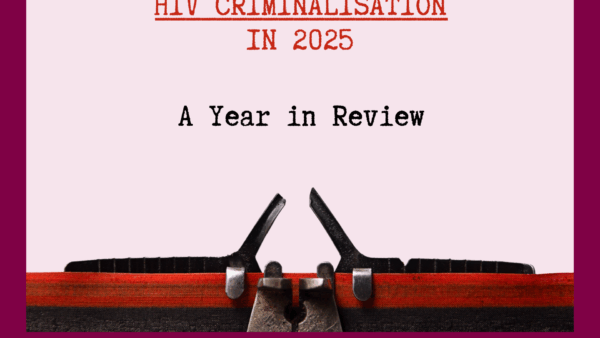From behind bars to the front lines of anti-criminalization advocacy
Bob Leahy talks to Ontario’s Chad Clarke about how Chad’s time in prison for non-disclosure of HIV status on an aggravated sexual assault charge turned him into a passionate advocate against HIV criminalization.
Chad Clarke, 45. lives in Dresden, a rural community in south-west Ontario (pop 2,500). He contracted HIV in 2004 but was not diagnosed until 2008. In February 2017 his story was featured in Toronto’s NOW magazine.
Said the article by writer Rob Easton “On February 12, 2009 he turned himself in on an aggravated sexual assault charge brought by his former common-law partner. A judge found Clarke failed to disclose his HIV status. He didn’t see the light until he walked out of prison more than two years later in June 2011, but his resurrection as an HIV activist could not have happened without the experience of prison, which led to his resolve to fight so no one would have go through what he did.”
Bob Leahy recently spoke at length with Chad to find out more. Here is Chad’s story.
++++++++++
It was on February 12 of 2009 that I received a phone call at work. I was building a house that day. It went “hello is that Chad Clarke? This is officer so-and-so and we have been looking for you.” I said “what is this regarding?” They asked me if I knew a particular person. We were in a common law relationship for two-and-a half years and we had separated on bad terms. I had got a phone call after we broke up accusing me of giving her HIV. At the time I did not know I was HIV-positive. When she had first contacted me and started harassing me on the phone I just said “do what you have to do.” I was contacted by Public Health who told me I needed to go get tested. I brought my then current partner with me and we went to the Byng (HIV) Clinic in Windsor. She came back negative. I was HIV-positive. I had no clue about HIV, about longevity, about treatment. I was on meds for about six months before the police contacted me.
Anyway the police said “there is a Canada-wide warrant out for your arrest.” They said the outstanding warrant was for an aggravated sexual assault charge. At that time my knees buckled. I got into my car and sat there and one cigarette led to five. Then I got a phone call and a female (police) voice said “Mr. Clarke, what are your plans?” I said “let me go home and say goodbye to my family. I will turn myself in to address this.” Then I threw the phone out of the window. I freaked out. I was paranoid.
I drove with my uncle to Newmarket to turn myself in first thing in the morning. My understanding was that I would be released on my own recognizance. When I approached the desk officer at the police station and said my name and why I was there they proceeded to put handcuffs on me. They told me I was now going for a bail hearing in Barrie.
We arrived at the Barrie courthouse and I went before the judge. It was duty counsel that represented me there. I didn’t have time to call a lawyer and besides I thought I was going home. But I was denied bail at the first bail hearing. I was very confused, no idea what was next or how this would unfold.
I was remanded into custody in the Penetanguishene jail. You have to go 90 days before you can go for another bail hearing. I got there about 9 oclock in the evening and they informed me I was going in to protective custody. It was because of my HIV status and because they didn’t want to put the general population at risk. And for my own safety because there might have been some backlash against me. I saw the nurse that night and I said to her “I’m HIV-positive and I’m on Atripla and I really need that medication.” She said “no problem, we will get it to you”. Then the jail goes into a Level 2 weapons lockdown because I’m high profile and they wanted to make sure there were no weapons and nobody was going to come after me. We were locked down for two weeks and in that time I did not receive my antiretroviral pills.
In April 2009 I went back to court for a second bail hearing and I had a plan that I was going to get out and fight it from the street. My family had pooled some money together and were willing to bail me out. But they bought up some things from my past and lo and behold I was denied bail once again. After that I got put in touch with a really good lawyer and he wanted to play the circuit, to get a good judge to hear the pre-trial. He didn’t inform me that there was a HALCO or a PASAN or any of that. That lasted for 13 months and when it was time to go to court I asked him “how much time am I looking at?” He said 10 to 15 years.
I had a daughter and son just going into their teens. I thought I was never going to see them again. I thought “somebody was going to stab me because they don’t like the fact that I’m HIV.” Finally it was whittled down and I asked my lawyer “if I plead guilty how much time would I get?” My lawyer told me four years was the best he could get me. At least it would give me a date to work on where I could see my loved ones.
So I pleaded guilty at the preliminary hearing to something I totally disagreed with. My hands were tied. There was nothing I could do.
So I was moved to a different unit of the range awaiting sentencing. I was befriended a lifer and he asked me if I had ever heard of PASAN? I made the call and got in contact with Mooky (Cherian) and Claudia Medina. Claudia showed me that there were people out there that cared. She sent me cards and tried to keep my spirits up and focused. Mooky said “I wished you had contacted us sooner, we could maybe have got you out sooner. It was unfortunate you pleaded guilty.” I said “that was what I was instructed to do.”
To be honest I didn’t have any problems with the inmates. I told them what I had and started educating them about Hep C. I had their backing. 100% of the inmates said “I shouldn’t even have been there. This is wrong.”
So we are at the 26-month mark and I had had no blood work done. I wanted Ensure to keep my weight on and the general doctor I would see – no HIV specialist – refused to give it to me. But I had a good rapport with the Byng Clinic and I called in every day and at one point I was taken to Sunnybrook Hospital to see Dr. Raclis about a bacterial infection I had. She put me in a separate room and proceeded to ream out the two guards about my health care. That was the only time I got to see any kind of HIV specialist.
At one time back at the jail I was pulled off my laundry job and I asked “why is that?” The guard said “we are concerned that you are going to spread your AIDS to other inmates because you are touching their clothes”. By this time Mooky had brought me up to speed about how HIV was contracted and I said “number one, I have no open wounds, number two HIV dies in the air within seconds and number three I’m wearing protective gloves – and I think you are an ignorant bastard.” So they proceeded to put me back on the range.
I had been sentenced to a 48-month prison term and in total I served 39 months in Penetanguishene. It’s maximum security. Just before you are released you are supposed to see a social worker to see if you are going to go on Ontario Works or ODSB, but I didn’t have a social worker approach me. I was getting scared. I had been in there a long time. How was my life going to change now that I’m out? So I got hold of the chaplain and I asked him if they could find an AIDS Service Organization (ASO) for me in Chatham because I was going to move back there, where my parents are. So I made a call to AIDS Support Chatham-Kent. I had two weeks left in my sentence so I got set up with my ASO and also made an appointment to see my doctor at the Byng Clinic.
When I was released on June 3, 2011 I went to live with my youngest brother. I was on a 250 acre farm in a rural area, out near Dresden where I am at now. I stayed there for six months, trying to readapt, trying to give myself a new identity. The Chad Clarke before I had gone to jail was no longer there. I was a different person. I felt isolated. I wanted to go back to Toronto.
In Toronto I was introduced to the Ontario AIDS Network and their PLDI (positive leadership) program and did their Level One training. Then after about eighteen months I moved back to the Chatham area and started volunteering with AIDS Support Chatham-Kent and started doing harm reduction work – they have a needle exchange program there. I was interested in that and felt this was my calling – and I haven’t stopped. I get a chance to engage with my community – I don’t call them “druggies” or “junkies”, I call them intravenous drug users. They have an identity. I don’t judge them. I share my story.
I was there until 2014 and something was telling me I needed to do something different. I went back to Toronto and enrolled in a George Brown sheet-metal program for a year. Then I decided to enroll at Ryerson University in a psychology, mental health and addictions program – I used to be an addict myself when I lived on the streets of Toronto. I was addicted to cocaine for many years and I needed others to see that I changed and if one person gets it I’ve done my job.
I got introduced to ACT and Toronto PWA Foundation and was helping with their therapeutic care department. Then I decided I wanted to go to B.C and see what harm reduction really is – and tell my story. I found out about the Jim Pattison Centre in Surrey, B.C. – they deal in positive living – and a place called Positive Haven; it’s no longer around and it provided produce for all the local food banks
At that time my daughter was pregnant and I wanted to come back home so I did and reconnected with the AIDS Committee of Windsor and their satellite centre, AIDS Support Chatham-Kent and started volunteering again, doing more in-depth harm reduction. I was there five days a week until last September.
Then I got involved with CPPN. I saw a posting from Christian (Hui) one day and I said “hey, there is finally a national organization in Canada for people living with HIV!” I wrote my story for Christian and he connected me with Alex McLelland; at that time Alex was doing research on people who had been charged under HIV criminalization laws. Alex came down from Montreal to my home and I shared my story. And we talked about the need for some kind of coalition. To me it’s wrong to be charged, it’s a human rights violation for being charged because you have an incurable disease in your body.
So he said that he would put me in contact with Richard Elliot (Canadian HIV/AIDS Legal Network). It was October 20 of this past year our group started the Canadian Coalition to Reform HIV Criminalization. I’m on the steering committee. We have kept in contact constantly as we got more members, from B.C., from the east coast, even defence lawyers.
I had the honour in February to sit down with two representatives from the federal Department of Justice and we read them testimony of other people who were presently or had been incarcerated for non-disclosure charges. It was very emotional.
So I thought “I’ve been there. I will be your voice while you are inside. I’ve gone through it.” I shared my story and one of the things I demanded was that Corrections Canada staff take an AIDS 101 program to address the ignorance around how they treat inmates. I also demanded that not just the Toronto police but police across Canada take AIDS 101 and it has to be renewed annually to stay up with the science. The coalition want to have a moratorium on non-disclosure prosecutions and we talked about the need for prosecutorial guidelines around non-disclosure cases. We are having a follow-up think tank in May to come up with a brief about that. I think we are going to have prosecutorial guidelines. For the first time in a long time I have some faith in the federal government around this.
Why do I do the work I do? I would hate to see any fellow brothers and sisters with HIV walk in the shoes I had to walk in. If I can educate with my story about what needs to be changed . . . Change needs to happen. I’m doing the work I am supposed to be doing. This is where I need to be.
I’m proud to share my story. I’m not ashamed of who I am.









